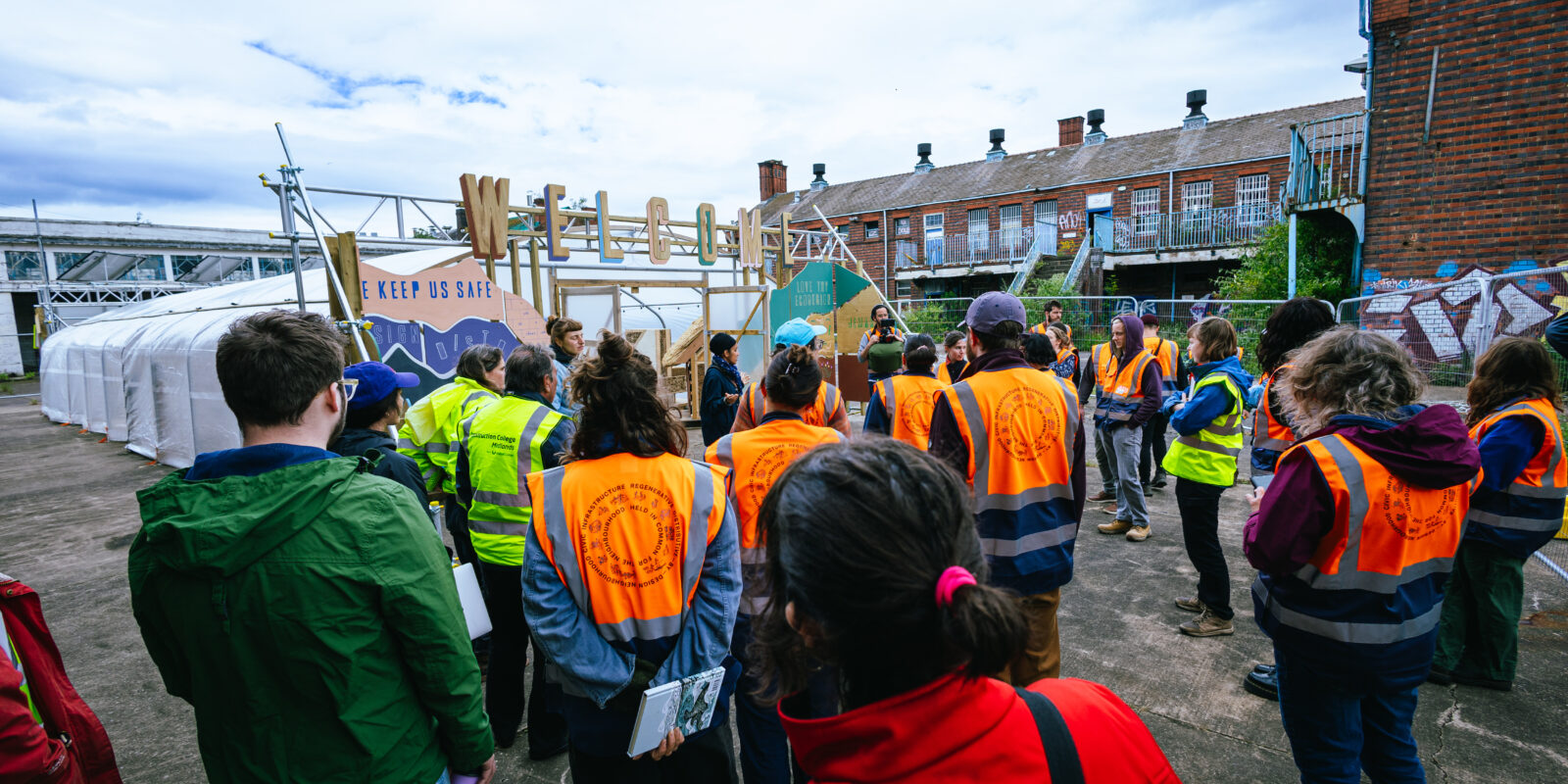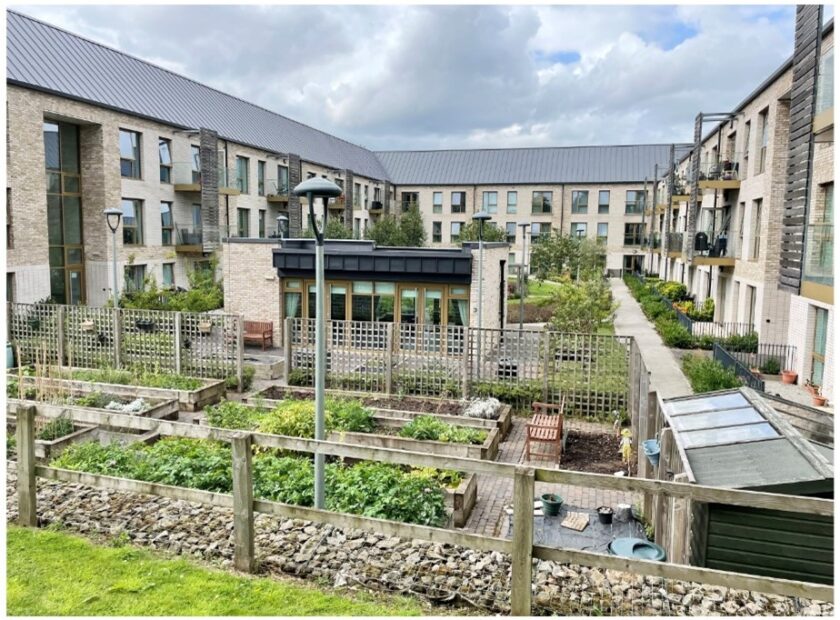(Photo: Civic Square aims to enable community-led transformation and transition in Birmingham. It is one of the case studies featured in the TCPA publication, Practical Hope: Inspiration for Community Action).
With the publication of the revised NPPF imminent and a new Planning Bill due in January it seems like an appropriate time to reflect on the fate of the democratic values which the TCPA has long advocated in town planning.
Planning reform has been a major theme of every December for the last 15 years. Each announcement has not, on the whole, been an ideal Christmas present. Central government’s addiction to blaming democratic planning for failures which lie elsewhere has led to frenetic pace of changing priorities. If there has been any common theme from successive governments, it has been the argument that democratic planning is bad for our nation.
The TCPA has made clear that even in its highly deregulated and underfunded state, the planning system is not the prime source of the housing crisis. The nation’s failure to invest in socially rented homes is the prime cause, closely followed by the business model of the volume housebuilders which have no incentive to build healthy and climate resilient homes at a rate that keeps pace with consents being granted to them by local councils.
However, these arguments have not proved to be persuasive to HM Treasury who have wrongly assumed planning is a barrier to GDP growth. In fairness to them, this assumption is not a disregard for planning as an organisational idea but rather the specific problem generated by its democratic character and particularly how decision making is undertaken at the local level.
The existence of such local voices is problematic for those in government whose main managerial assumption is based on ‘command and control’. In this Whitehall world view, it seems that people are a problem to be bypassed. Communities are assumed to be incapable of understanding their own best interests – an attitude which quickly descends into the infantile name calling around ‘Nimbys’.
Communities are assumed to be incapable of understanding their own best interests – an attitude which quickly descends into the infantile name calling around ‘Nimbys’.
The response of successive governments to this orthodoxy has been to develop law and policy which centralises decision making and limits the scope of discretion for local authorities. The announcement that democratically accountable planning committees are to be bypassed in order to enforce the government’s new housing targets was the latest in a long line of measures which began in 2008 by limiting the legal rights of the public in major infrastructure decisions. It has gone on to include the widespread expansion of permitted development rights, which marginalises the voice of people and their elected representatives and includes the forthcoming National Development Management Policies designed to restrict communities from setting localised policy.
The latest announcement has, in fairness to the government, yet to be precisely determined, but, in an arena where public trust in the planning process has collapsed, policy makers need to have as much regard to the perception as to the reality of changing the governance of planning.
As the Raynsford Review found, public trust in planning has declined partly because of the consistent drive to marginalise the voice of the public in decision making. At the same time, beyond the creation of neighbourhood planning, no attention has been paid by government to supporting communities to properly participate in planning decisions. The last comprehensive policy statement on the government’s objectives for public participation was revoked in 2012 and never replaced. This is despite the obvious asymmetry between the resources and expertise of the development sector and many communities whose opportunities for a voice in the system are already strictly limited by regulation.
Public trust in planning has declined partly because of the consistent drive to marginalise the voice of the public in decision making.
The latest proposals will bear down on one of the few remaining balances on the system which is the ability of those serving on a planning committee to exercise their democratic rights, so long as they conform with public law principles. The proposals are contained in a working paper, rather than a formal public consultation, designed to promote ‘debate in the sector’. The effect of the paper is more draconian than proposals flagged by the Secretary of State containing options to strip planning committees of any involvement in any application judged, by an as yet undetermined body, to be in accordance with the local plan policy. This will be achieved through a centrally imposed scheme of national delegation. Final decisions will be made by planning officers with no democratic oversight. The paper is clear that all this is designed to achieve certainty for developers.
To be clear, the discretionary planning system is founded on the ability of elected members to depart from plan policy, so long as they do so inside the strict boundaries of public law principles and probity. The justification for this second democratic moment is that local plan allocations for housing do not go through the rigorous process demanded by full planning applications. They do not involve any site-specific exploration of ground conditions or archaeology, nor do they involve any appreciation of the final design, amount of affordable homes, or section 106 agreements, which are all finalised at the application stage. Since the detailed impacts revealed at this second stage have a profound impact on the design and wider suitability of a site, they represent a major planning decision just like any other.
Values and judgments are engaged which are intrinsically political and should remain so. Significantly bypassing elected members will of course mean no formal planning committee, which will also end the ability of the public to be heard in person when a final decision is made. This removal of the public’s right to have a voice at the point that final consents are made will be extremely divisive, and risks reinforcing the perception that decisions are made between professionals behind closed doors. It will politicise the planning service making planners solely responsible for highly controversial development. Above all, it will mean planning decisions are undemocratic at the most important stage of the process, where consents are finally made.
There is no doubt that bringing restrictions on elected representatives into law will be highly controversial and in focusing on the detail of these measures there’s a danger we lose sight of the bigger picture, which is the importance of preserving democratic planning in the public interest.
Democracy and meeting housing needs are not incompatible ideas. The post-war Labour government had a strong moral sense of wanting to deliver homes for those most in need and to that end they gave decision making on normal town and country planning decisions to the local level when they could have given it to a centralised land board. They recognised that it was local authorities and the communities they represented who are best placed to understand the complex needs of England’s diverse communities.
Government restricted its remit to the strategic level through what was then the New Towns programme and even then, the majority of New Towns were negotiated locally rather than imposed. Of course, the post-war Labour government invested heavily in homes for social rent, which was a vital component in being able to build at pace for those most in need.
As with many other aspects of planning reform, the drive to exclude community voices because they ‘create delay’ is based on mythology rather than evidence.
As with many other aspects of planning reform, the drive to exclude community voices because they ‘create delay’ is based on mythology rather than evidence. For example, a vital precondition for understanding how to make the planning system more efficient is to be clear about what delay actually means. Democratic accountability should never be confused with unnecessary administrative delay and public participation should not have to pay the price for the chronic under funding of the planning service.
Central government has never had the humility to accept that the greatest source of administrative delay in planning is the continuous and radical changes to policy and law which have dominated the system for the last 20 years. People exercising their normal democratic rights in a democracy does not constitute delay. If it did, then we can assume that all forms of electoral practise that are contrary to the objectives of Whitehall should be strictly limited.
Almost 12 months ago I wrote a piece called the Seven Greatest Mistakes of Planning Reform. The first and greatest of those mistakes is to ignore good governance and particularly the need to rebuild public trust in decision making. This is important because the drive to centralise decision making is not simply wrong as a matter of democratic principle, it is also short-sighted in terms of practical effectiveness. Planning represents the most contentious issue for local government and will be increasingly a pressure point for parliamentarians. Measures which do, or are perceived, to further marginalise community voices will result in bitter opposition.
Planning represents the most contentious issue for local government and will be increasingly a pressure point for parliamentarians.
Outside of parliament, a sense of the centre dictating to communities is a gift to those populist right-wing politicians who so ably exploit planning issues for their own electoral gain. The government may be rightly in a hurry to achieve its mission on housing, but it risks making delivery much worse by a failure to understand the importance of public trust.
There is a better approach, but it depends on the government recognising the importance of a social contract between communities and central government in the way we develop our nation. The bones of that contract must include clear and defined legal rights for communities as well as clear and settled powers for local government over decision making. Both parties have to take their responsibility for housing those in greatest need seriously and effectively and central government should always retain the power to intervene where those needs are not met. It should use these powers wisely and as a last resort.
Government must also be clear and explicit about the principles it wishes to see surrounding public participation, not least by a comprehensive review of how people can involve themselves in the planning process – a subject last explored in the Skeffington Report of 1969. Fifty-six years seems a long time to wait for a review on the most important issue in planning reform.
Finally, whatever the wider implications for civil society of centralising planning decisions they run counter to the core principles of the TCPAs view of good planning. For us, and the many community organisations we work with, people are part of the solution, not a problem.
Through our work on climate change, we find countless examples of communities fighting for genuinely zero carbon housing policy in local plans only to be thwarted by outdated centralised policy. We find other communities with a better grasp of their resilience needs then many government agencies. We set out some of these positive initiatives in the publication Practical Hope and they represent an extraordinary and untapped energy in our nation which needs support and enablement. Whitehall needs these people.
In an era when flood defence is being cut back and where a wide range of other service provision is now apparently unaffordable, communities must prepare themselves to play a much more active role in their future development.
In an era when flood defence is being cut back and where a wide range of other service provision is now apparently unaffordable, communities must prepare themselves to play a much more active role in their future development and, in some cases, in their survival. This is an extraordinarily positive agenda that could present itself as a remarkable solution if only we could conceive of a Westminster and Whitehall that wanted to be helpful and enabling rather than crushing local innovation.
And a final word of warning from our experience working with people on the ground in communities across England. In a democracy you cannot build without some level of consent and acceptance, and you cannot ultimately achieve that without prioritising a sense of care and the sense of listening to those whose lives and livelihoods you are about to transform.
Our Shared Future: a white paper for homes and communities – TCPA
Planning reforms will end development chaos, says Angela Rayner – BBC News
Planning Reform Working Paper – Planning Committees




